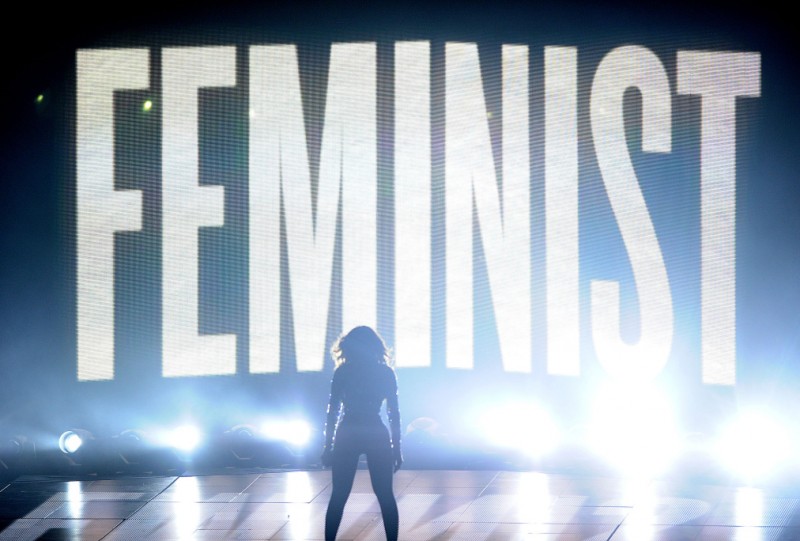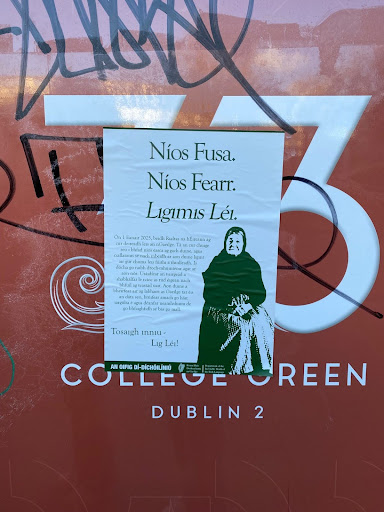Rosalind Ní Shúilleabháin | Contributing Writer
Beyoncé slayed a 17-minute set at the MTV Video Music Awards last week, cementing her status as a symbol of sexual awakening, feminist liberation and indeed as the most powerful entertainer in the world. The word ‘feminist’ lit up on stage behind her, twenty feet tall in bright shining lights. Her husband Jay Z cheered her on from the audience, briefly appearing on stage with their daughter Blue Ivy to present her with a lifetime achievement award. But it was Bey’s moment, and nobody else’s.
‘I’m not bossy, I’m the boss,’ she said, but Beyoncé’s power transcends even that of Sheryl Sandberg. Beyoncé transcends class, race, the working woman debate and has arguably finally thrown feminism into the pop mainstream. But feminism is a word as complex as culture; Beyoncé simultaneously empowers and alienates women, and social media is smattered with complaints that she is not a ‘real’ feminist. Who is this ‘real’ feminist, and why does she cower behind the intellectual snobbery of those who dismiss the impact and legitimacy of celebrity?
Parading around in your knickers doesn’t always qualify as sex positive feminism, but the freedom and choice to do so does. The recent trend of sexually liberated female pop stars has stirred a controversial pot; is Miley Cyrus an empowered woman, or a rebelling child star? Is her sexual liberation only allowed because she’s a certain size, presenting herself in an androgynous, almost child-like manner? Miley Cyrus, Rihanna et al may think they are asserting their sexuality, but their sexual liberty arguably exists for the approval and enjoyment of men, pulled by the marionette strings of misogynistic music executives.
Beyoncé transcends this debate; an articulate, formidable songwriter and performer, she controls her own destiny. She sings double entendres about surfboards and monogamous sex in ‘Drunk in Love.’ She samples a prominent Nigerian writer in ‘***Flawless,’ with not a twerk or flash of cultural appropriation in sight. Her sexual liberation is a badge of honour, an embracing of alter ego ‘Sasha Fierce’ and her new role as Mrs. Carter. Beyoncé fits into her new family unit, but she’s still Beyoncé.
She’s not perfect either. Song ‘Pretty Hurts’ grapples with body image and eating disorders, starring Beyoncé as a troubled beauty pageant contestant in its accompanying music video. A powerful song penned by Sia, it is somewhat difficult to reconcile with Beyoncé’s many L’Oreal ad campaigns which lighten her skin and hair. Beyoncé seems to promulgate the exact culture that drives women to hate themselves in the first place. She is much lauded in the media for her ‘curvy’ figure. She discusses diet and exercise at length in interviews; at a UK size 6-8 and recently sporting the coveted thigh gap, Beyoncé is as much a victim of the mass media as anyone else. However, ‘Pretty Hurts’ picks up where TLC’s ‘Unpretty’ left off fifteen years ago, and Beyoncé must be applauded for admitting vulnerability. She tells us that ‘perfection is the disease of a nation.’
The slut-shamers on Twitter point to the hypocrisy of her sexy image and feminist politicising; the real dichotomy probably lies with her overtly religious beliefs and sex-inspired music. But if anyone can pull off thanking God in a VMA acceptance speech, five minutes after humping a horse’s saddle on stage in front of her two-year old child, it’s Beyoncé.
However, sex positive feminism is problematic in that it simplifies the movement and its women. Does Beyoncé alienate feminists who cannot or do not want to identify with her message? Bhatti, a Muslim-American spoken word poet went viral for her piece ‘Mu(sick)’ criticising Beyoncé’s VMAs performance. Neither woman is wrong and neither fails the feminist movement; equally neither woman can claim to be a superior feminist. Feminism is multi-faceted and cannot be forced into a cookie-cutter definition of ‘correct’ female empowerment.
Has Beyoncé successfully brought ‘feminism’ to the mainstream, or simply the word ‘feminism’ itself? Either way, she has succeeded. Feminism is often white and middle-class and takes place between university students on social media threads. It has an often-limiting academic focus – the ‘winning’ feminists are the most verbose, the ones who can shame others into silence for not being familiar with certain terms or certain chapters of Judith Butler, and not getting enough Facebook likes for their passive aggressive take-downs. How many women worldwide – even the self-proclaimed ‘real’ academic feminists – knew the name of an African feminist? Millions of girls now know who Chimamanda Ngozi Adichie is. Millions of girls now know that ‘feminism’ is not a dirty word. That, even more than the fact that she has endured for so long in such a transient industry, is surely her crowning achievement to date.
Beyoncé cannot claim to represent all women; she can only represent herself. The choices she makes in this representation and the power it enables her to have – this is precisely what makes Beyoncé a feminist.







